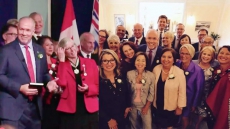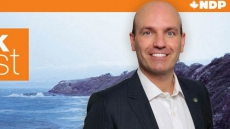VANCOUVER — Doctors at over 300 walk-in clinics in British Columbia want fair payment for their work compared with those in full family practice, says the head of an association that's rallying its members to increase access and profits through innovative technology.
Mike McLoughlin, founding director of the Walk-In Clinics of BC Association, said the facilities fill a gap for patients who can't get a family physician or same-day appointments and should be considered an important part of reforming primary care.
The association gathered for its annual general meeting Friday, where members were expected to discuss various issues such as negotiations between the government and Doctors of BC, the association that represents the province's physicians, whose master agreement will expire in March.
McLoughlin said walk-in doctors often see patients with complex conditions such as diabetes, high blood pressure and chronic obstructive pulmonary disease but can't charge the extra fees that are paid to full family physicians.
"Step up and pay the doctors for equal work that they do," said McLoughlin, who, along with his wife, a family doctor, owns a walk-in clinic in Kelowna.
He said some walk-in clinics have been forced to close as doctors retire and there aren't enough new ones to replace them, and patients can end up going from one clinic to the next or to the emergency room, costing the health-care system more money.
McLoughlin said access to care is further eroded by a quota for walk-in doctors who are paid to see up to 50 patients a day, followed by half the fee payment — or about $30 for a basic visit — until they reach 65 patients and then they get no fee at all.
"It's wrong. This 50-person-a-day cap has created this anxiety among patients that they gotta get there early to see a doctor," he said, adding long lineups outside clinics means they must close when the quota is reached.
He said many of the clinics could consider working towards enhancing technology to provide patients with better service, beyond seeing wait times online.
McLoughlin also called on the government to work toward allowing patients' electronic medical records to be accessible to any physician they see, whether they are at their regular doctor's office, a walk-in clinic or an emergency department.
Dr. Eric Cadesky, president of Doctors of BC, said walk-in clinics provide "episodic care" but their physicians don't do the work to justify an annual bonus for treating complex conditions that must be regularly monitored through an ongoing relationship with patients.
"Every day I probably call 10 to 20 patients, I probably email another 10 or 30 patients," he said. "Sometimes the person doesn't need to see a doctor and sometimes I may not be in the office. It may be on the weekend or I may be away but I'm able to continue that relationship and help people make the best decision possible."
Continuity of care is missing in walk-in clinics, though he's hopeful they will be involved in changes to primary care, Cadesky said.
"In an ideal system patients would be able to access doctors that know them and know their history and are able to care for them in the context of an ongoing relationship."
Health Minister Adrian Dix said walk-in clinics could be part of the move to attach more patients to family doctors through yet-to-be opened primary care networks that will have various health-care providers including nurse practitioners, physiotherapists and dieticians.
"We have a very significant group of people who are unattached to a family doctor, currently in excess of 750,000 people," he said.
"Walk-in clinics absolutely play a valuable role today and I actually think there's potential for them as private primary care networks to work with other practitioners in the community."
The government is working to harmonize electronic medical records in order to enhance time-saving access to patient information after the previous government's failed attempts cost millions of dollars, Dix said.
"I think making sure that everyone has appropriate access to the record is an important and useful thing and community by community we have to make sure that happens," he said. "I'm very disappointed. I would have assumed 10 years ago we would have been further along.
Ujjal Dosanjh, a former federal health minister and premier of British Columbia, was scheduled as a keynote speaker at the walk-in clinics' meeting.
While the clinics provide vital access to doctors who should have access to electronic medical records, the patient quota should not be scrapped, Dosanjh said.
"If you go to 70 patients a day I'd say it's more of a commercial enterprise than a public health enterprise."


